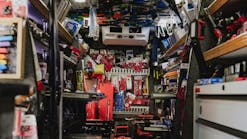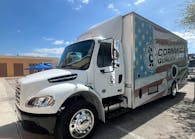Selling heavy duty scan tools: Are you ready … and willing?
In business, there’s an advantage to being “first to market”. Being a step ahead of the competition positions you as the leader and can earn you a premium price for promoting and selling cutting-edge technology.
But market leadership often means making an investment.
Heavy duty scan tools are not new. But, the need for them is growing. So, chances are you can still be the first mobile tool distributor on your route selling HD scanners.
Whether you are the first one or the last one to market, you can succeed if you’re willing to make an investment in learning about product and buying a demo unit or two.
Q: How much does the typical HD scan tool cost?
A: If I’ve learned anything about HD scan tools it’s that nothing is typical.
OEM tools can run $15,000 or more and are specific to one manufacturer’s vehicle models. Aftermarket tool prices range from $300 to $400 for an entry-level generic code reader, to as high as $10,000 to $12,000 for a bi-directional scan tool with diagnostics data on vehicles from diesel trucks to farm tractors to construction equipment.
Q: So can a code reader fix a truck or does a tech need a scan tool?
A: A code reader just reads codes, where a scan tool reads live data. A bi-directional scan tool can do things like set idle speed, complete injector coding, or most importantly, do forced regens (burning off soot in the diesel particulate filter). But no tool can fix a vehicle without a technician knowing at least basic diagnostics, says Bill Peek, a veteran technical trainer and co-creator of Modern Diesel Diagnostics (TechDVD.com). Not all tools perform all functions.
"There isn't a fix-the-vehicle button," says Michael Flink, National Trainer for Autel (www.auteltech.com). “The scan tool isn’t going to tell you how to fix the vehicle. The technician needs to know that.”
Q: Should I approach the shop owner or technicians?
A: The price dictates most decisions. Technicians tend to purchase lower-cost code readers. Shops tend to purchase big ticket scan tools, says Victor Rivilla, marketing director with CanDo Diagnostics (candointl.com)
But it’s still not a bad idea to approach the diesel technician first when promoting HD scan tools. Unless the shop owner or manager also turns a wrench, he or she usually relies on technicians when making a technical purchase decision. And in some shops, a high-volume technician may even purchase his or her own scan tool.
Selling the fleet manager may require making an appointment. In this case, it’s also best to prime the pump by getting the technicians on-board with a specific tool before taking the time to approach the fleet manager.
Q: So, do I need to hold training seminars to sell scan tools?
A: The idea of “tool school” is old school.
Asking someone to take a Saturday or a night to learn about diagnostic tools doesn’t really get that well populated, says Don Jordahl, product planning manager at Cornwell Tools (cornwelltools.com).
“I think the better thing to do is a ‘six-minute sell’ to stimulate interest,” Jordahl says.
In a six-minute sell, a tool dealer does a short product pitch. After six minutes, you’ve either piqued the customers’ interest or not, explains Jordahl. More time doesn’t make any more impact.
Once you’ve got the customer interested, you need to ask some questions to get to know more about how the customer would use a new scan tool.
Q: What questions do I ask? Doesn’t every shop use the tool the same way?
A: First, you want to match the tool with the vehicles the customer services, says CanDo’s Rivilla. Different scan tools offer different feature sets and every shop services different vehicles.
Not even how a fleet looks is the same.
One fleet may buy 50 2016 Freightliners, says Cornwell’s Jordahl.
“Oftentimes what happens in that type of a fleet is the manufacturer—Freightliner in this case, makes available, or gives them, the diagnostic package for their PCs to work on these vehicles.”
Another fleet, for example, may be a local moving company with a dozen tractor trailers that are all different make and models, Jordahl continues.
“That kind of a fleet is where you need a tool that is well-rounded, such as those available in the aftermarket,” he says.
Here are some typical questions to ask the technician or shop manager:
● What scan tools are you using now?
● What would you improve on the tool if you could?
● What is the age range of vehicles in your fleet?
● Do you work on both light duty vehicles and heavy duty trucks?
● Do you also work on farm or construction equipment?
Q: Isn’t the real cost of a scan tool the on-going subscription?
A: You’re absolutely right! It’s like buying a Roku to stream video to your TV. The Roku box might only cost $40 at Walmart. It’s the on-going subscription to Hulu, Netflix and other services that are the real cost in the long run.
HD scan tool subscriptions provide updates to both the software and the data. They’re generally free for the first year or two.
“The renewal price range is fairly wide, from roughly $600 to $2500 depending on the product and level of software,” Jordahl says. “A dealer can make up 30 points on an update. He's missing an opportunity to make money if he's not selling them when and where he can."
More important to you as a dealer is knowing which, if any, manufacturer will pay you for selling data subscriptions. For example, CanDo has this relationship with some flags.
The technology is so new and growing so fast that many scan tool makers update their data and software every week or two. They aren’t just updating data on the newest vehicle, but often updating the software as well.
But, unlike OBD-II scan tools, some subscriptions will stop working after the expiration date, while others will continue to work using the old data and software. It’s important to know which is which so you can inform your customer.
Q: Is there really a scanner port on earthmovers and agricultural equipment?
A: Government regulations say any diesel engine over 75 hp must have clean air technology, meaning some level of on-board diagnostics -- and that requires a scan tool, says Modern Diesel Diagnostics’ Peek. A rule of thumb is 14,000 lbs or more (or a class 4 truck), but there are many small vehicles and stationary engines with 75 hp engines.
Thank the EPA for creating the biggest demand for HD diagnostics tools: Forced regen.
The technical explanation: A forced regen (or Forced DPF regeneration) cleans the diesel particulate filter (DPF) by injecting diesel exhaust fluid (DEF) -- which is made up of automotive-grade 32.5 percent urea and deionized water -- into the built-in ceramic container and heating it to up to 1,300 degrees F until it basically comes out as nitrogen and water, explains Peek.
The simple explanation: If a vehicle needs a forced regen there’s no waiting and the technician needs a scan tool to get the job done.
Q: So, this is about more than just trucks?
A: It’s about far more than just trucks. It’s basically anything with a heavy duty diesel engine, including buses, boats -- and even some really big lawn mowers!
That means your potential market now isn’t just independent truck repair shops and fleet garages but any shop repairing farming or construction equipment, large forklifts, electrical generators, and even marine repair centers. You may call on these shops already, or this may be a great source of new customers for you.
Although new truck dealerships likely have OEM-specific scan tools for the makes and models they sell, many also have used truck lots and need aftermarket scan tools for brands outside of their OEM box, so don’t rule them out, either.
Q: So, the average automotive shop doesn't need an HD scan tool, right?
A: Actually, some of your automotive customers may do significant truck business, too.
Some shops that service light duty vehicles may also find themselves servicing some heavy duty vehicles, says Harlan Siegel, Vice President of Launch Tech USA.
Maybe a shop has a new fleet customer with mostly F150s and F250s and a couple diesel F350s, F450s or other class 4 or 5 diesel vehicles. The shop now needs an HD scan tool.
Some scan tool makers, like Launch, have scan tools that work on both consumer and HD commercial vehicles class 4 through 8 using the same tablet with a software and cable upgrade kit.
Also, the flip side may be true. Many heavy duty shops also need a scan tool to service light duty vehicles, says Siegel. "Their fleet that runs around to service these trucks … are in fact not heavy duty trucks. And some of these shops are quite large and have a very large field fleet."
Q: Why is the price range all over the board?
A: Part of it is price differences are cost of the various features. Part of it is the cost of OEM information. Some companies buy data directly from the OEM, which is costly. Others create a database of information by, in essence, reverse-engineering the data.
Unlike generic OBD-II on cars and light trucks, which has been standard on every consumer vehicle since 1996, there’s not a full set of standards for heavy duty on-board diagnostics and there are no Right-to-Repair laws in place yet, says CanDo’s Rivilla.
Because of this, HD scan tools have to do a lot: protocols vary, OEM diagnostic data differs, and even the physical connectors can range from OBD-II 16-pin, to 6-pin and 9-pin connectors, to brand-specific connectors on Isuzu, Mercedes and others.
Even the same two vehicles may not actually be the same.
Q: But isn’t one 2013 Navistar just like another 2013 Navistar?
A: In North America, heavy duty trucks are “spec’d,” that is the buyer can choose the engine they want, and often even the transmission and braking system they prefer.
A 2016 Kenworth can have a Caterpillar, Cummins or Detroit Diesel engine with a wide variation of make and models of transmissions and brakes, says Peek.
Q: I don’t know enough about heavy duty scan tools to do a good demo. Any advice?
A: Don’t do a demo, leave a demo.
Live demos take time. And as a salesperson your time is money. Besides, the average customer will only remember a small percentage of what you said once your demo is over.
A better approach may be to lend out your demo unit to a different shop every week.
Once a customer experiences the tool in his or her shop on a day-to-day basis, he or she will more likely see the benefits. They’ll basically sell themselves. Just be sure you provide the manufacturer’s support number to address any questions.
Some tools, like CanDo’s and Launch’s, allow remote login. This means a tech support person can even log in to a customer’s scan tool and do remote diagnostics.
Q: How do I handle the customer that thinks I’m tech support?
A: Be sure you give each new scan tool owner a tech support number.
Remind the customer you are there to provide add-ons and service any warranty issues. But you aren’t an expert in the tool, tech support is.
Also, you may want to remind them about programs at your local tech school or community college at nationwide training events where they can learn the newest techniques. You might also connect with local or nationwide trainers who will contract with the shop owner or manager to do in-shop training, say Peek.
Note: Phil has a marketing relationship with Bill Peek.


